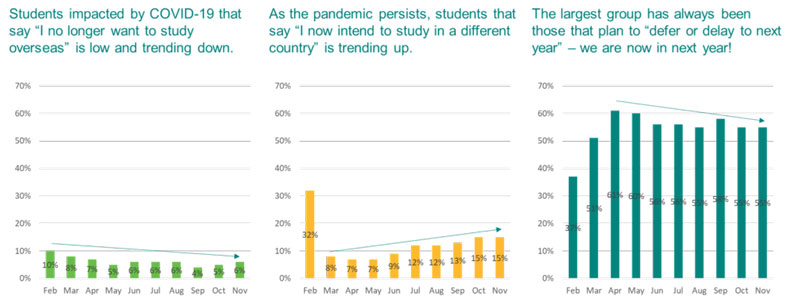Road to Recovery: Reason to be optimistic #1

While the pandemic continues to cause uncertainty for the mobility of international students and the short-term future of the global education sector, you could be forgiven for having a pessimistic outlook. However, our Road to Recovery work which considers global data trends from across the sector and insights from our own agent community, gives us reason to feel more confident about the recovery of international education.
In this series of Insights pieces, Jon Chew (Head of Strategic Insights and Analytics at Navitas) shares five reasons to be optimistic, which were initially shared at the Navitas Virtual Business Partners Conference held in January 2021.
Reason to be optimistic #1: Students are committed to studying overseas and will change destinations rather than cancel
Throughout the pandemic, students have demonstrated their resilience and commitment to following through on their study plans. One of the most significant indications of the level of commitment from international students came in the early weeks of the pandemic when Australia first imposed a travel ban for anyone who had spent the last 14 days in China. Over 100,000 Chinese international students were caught out by the travel ban introduced on 1 February 2020, right in the middle of Chinese New Year celebrations. Between 1 February and the complete closure of borders on 20 March 2020, approx. 47,000 Chinese citizens circumnavigated the travel ban arriving via third countries.
Throughout the pandemic, surveys of international students have repeatedly shown the proportion of students cancelling in the range of between 3 and 10 per cent — a very low figure considering the seemingly insurmountable barriers that have emerged. Most students have responded by simply deferring and delaying their travel plans.
Interestingly, recent surveys by QS and IDP show that the proportion of students cancelling their study plans is actually falling as the pandemic wears on.
One important shift that has taken place since COVID-19 first hit is the growing numbers of students that are now entertaining the idea of changing study destinations. As the QS survey shows, each month has seen the proportion of students saying “I now intend to study in a different country” gradually creeping upwards to 15%. This is consistent with feedback from our colleges and agent network that students and parents are becoming increasingly impatient and eager to follow-through on their study plans – particularly with regard to Australia where borders remain closed.

Source: QS Impact of coronavirus on global higher education (n = 66,000, February to August), QS September 2020 and beyond (n=3,000, September), QS Higher Education In 2020: How Covid-19 Shaped This Year (February to November).
Since the start of the pandemic, students have demonstrated the depths of their commitment to studying overseas – continued border closures and outbreaks in 2021 may drive students to change destinations but we are confident that the vast majority will follow through on their plans to travel abroad.
This Insight article is one in a series of five reasons to be optimistic. Read the full article here.